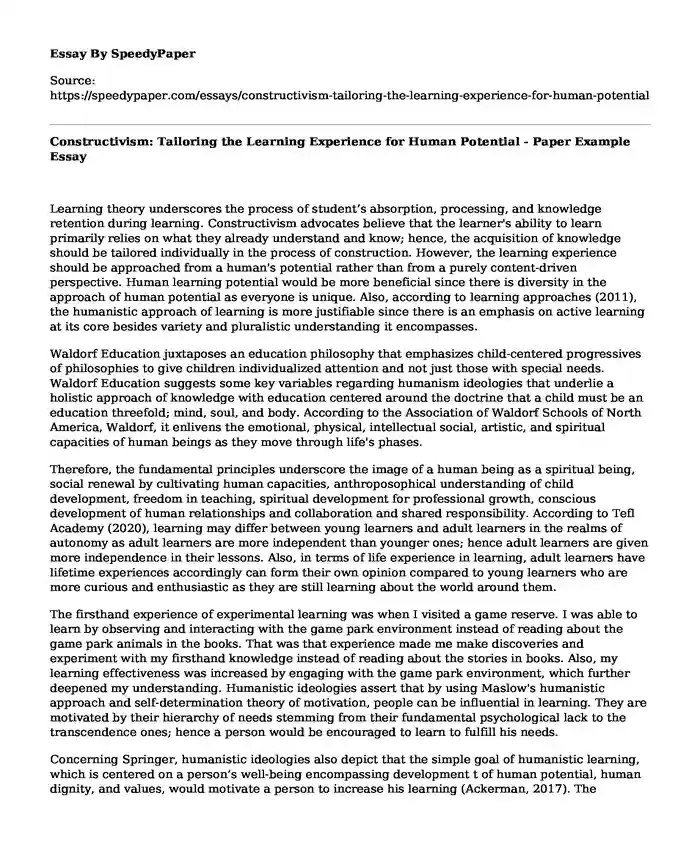Learning theory underscores the process of student’s absorption, processing, and knowledge retention during learning. Constructivism advocates believe that the learner's ability to learn primarily relies on what they already understand and know; hence, the acquisition of knowledge should be tailored individually in the process of construction. However, the learning experience should be approached from a human's potential rather than from a purely content-driven perspective. Human learning potential would be more beneficial since there is diversity in the approach of human potential as everyone is unique. Also, according to learning approaches (2011), the humanistic approach of learning is more justifiable since there is an emphasis on active learning at its core besides variety and pluralistic understanding it encompasses.
Waldorf Education juxtaposes an education philosophy that emphasizes child-centered progressives of philosophies to give children individualized attention and not just those with special needs. Waldorf Education suggests some key variables regarding humanism ideologies that underlie a holistic approach of knowledge with education centered around the doctrine that a child must be an education threefold; mind, soul, and body. According to the Association of Waldorf Schools of North America, Waldorf, it enlivens the emotional, physical, intellectual social, artistic, and spiritual capacities of human beings as they move through life's phases.
Therefore, the fundamental principles underscore the image of a human being as a spiritual being, social renewal by cultivating human capacities, anthroposophical understanding of child development, freedom in teaching, spiritual development for professional growth, conscious development of human relationships and collaboration and shared responsibility. According to Tefl Academy (2020), learning may differ between young learners and adult learners in the realms of autonomy as adult learners are more independent than younger ones; hence adult learners are given more independence in their lessons. Also, in terms of life experience in learning, adult learners have lifetime experiences accordingly can form their own opinion compared to young learners who are more curious and enthusiastic as they are still learning about the world around them.
The firsthand experience of experimental learning was when I visited a game reserve. I was able to learn by observing and interacting with the game park environment instead of reading about the game park animals in the books. That was that experience made me make discoveries and experiment with my firsthand knowledge instead of reading about the stories in books. Also, my learning effectiveness was increased by engaging with the game park environment, which further deepened my understanding. Humanistic ideologies assert that by using Maslow's humanistic approach and self-determination theory of motivation, people can be influential in learning. They are motivated by their hierarchy of needs stemming from their fundamental psychological lack to the transcendence ones; hence a person would be encouraged to learn to fulfill his needs.
Concerning Springer, humanistic ideologies also depict that the simple goal of humanistic learning, which is centered on a person’s well-being encompassing development t of human potential, human dignity, and values, would motivate a person to increase his learning (Ackerman, 2017). The variables of organismic integration theory (OIT) reflect the humanistic variables since OIT asserts that intrinsic motivation depends on the extent of the presence of autonomy. This autonomy is discussed on the humanistic variables, which are also based on the orientations of independence, control, impersonal, and efficacy.
References
Ackerman, E. (2017). Self-determination theory of motivation: Why intrinsic motivation matters.PositivePsychology.com. https://positivepsychology.com/self-determination-theory/
AWSNA principles for Waldorf schools. (n.d.) Association of Waldorf Schools of NorthAmerica. https://www.waldorfeducation.org/waldorf-education/in-our-schools/awsna-principles-for-waldorf-schools(c)
Copyright skillsyouneed.com 2011-2020. (n.d.). Learning approaches. Skills You NeedHelping You Develop Life Skills. https://www.skillsyouneed.com/learn/learning-approaches.html
Ed. (2020, June 8). Six differences between teaching adults and young learners. TEFL – TeachEnglish As A Foreign Language - The TEFL Academy. https://www.theteflacademy.com/blog/2017/01/6-differences-between-teaching-adults-and-young-learners/#:~:text=Life%20experience,students%20bring%20to%
Humanistic approaches to learning. (n.d.). Springer Reference. https://doi.org/10.1007/springerreference_302390
Cite this page
Constructivism: Tailoring the Learning Experience for Human Potential - Paper Example. (2023, Nov 25). Retrieved from https://speedypaper.net/essays/constructivism-tailoring-the-learning-experience-for-human-potential
Request Removal
If you are the original author of this essay and no longer wish to have it published on the SpeedyPaper website, please click below to request its removal:
- Knowledge is Power, Education Essay Sample
- Statement of Intent for Graduate School - Essay Examples
- Why Is Reading Good for You - Our Essay Sample Explains
- Free Essay: Effective Learning Environment for Early Years Education
- Educational Psychology Essay Sample: Curriculum Adjustments for Children with Low Functioning Autism
- Free Essay - Statement of Purpose for Computer Science Major (Online Program)
- Free Essay. Description of the Child's Puzzling Behavioral Patterns
Popular categories





